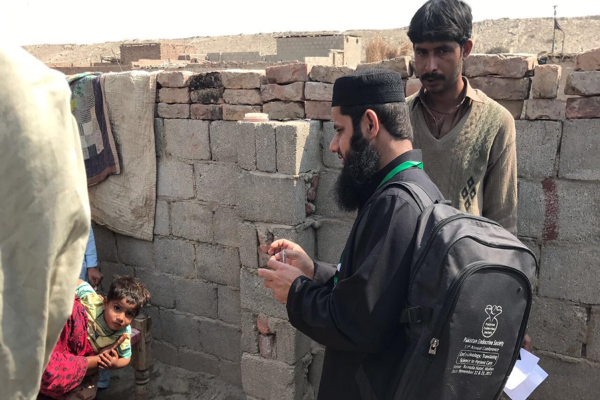Investigators from the Aga Khan University (AKU) are actively investigating a large outbreak of typhoid fever bacteria that are resistant to ceftriaxone, an antibiotic commonly used by physicians to treat this infection. Previous work from investigators at AKU had uncovered very few cases of drug-resistant typhoid, but a recent increase in cases from Hyderabad has alarmed both physicians and communities. Common symptoms of typhoid include fever, headache, and nausea accompanied by vomiting or diarrhea, especially among children. If left untreated, typhoid can cause severe and deadly complications. While the infection can be treated with available antibiotics, an increasing number of resistance cases are being reported where ceftriaxone has been used. “This antibiotic losing its efficacy means we have to find new ways of treating typhoid, and prevent cases,” says Dr. Farah Qamar a paediatrician and epidemiologist.
The AKU clinical laboratory team identified a trend of increasing resistance in typhoid fever from Hyderabad in December and notified investigators of the outbreak. “Identification of the outbreak was made possible by continuous monitoring of typhoid fever resistance,” said Dr. Sadia Shakoor. To date, more than 250 cases of resistant typhoid have been identified and if this outbreak cannot be controlled in a timely manner, it might spread to other parts of the province and country. Outbreak investigation efforts are led by Dr. Qamar and her team of epidemiologists who are actively trying to identify the sources of this outbreak. The team members include Drs. Momin Kazi, Tahir Yousafzai and Khalid Saleem. “It is important to also educate the public in hygiene measures so as to prevent cases of typhoid from occurring,” said Dr. Qamar. “An effective way of preventing typhoid fever is vaccination, but vaccines have remained underused. We are advocating to change that.” There has been one death of a six-year-old girl due to the current outbreak at Hyderabad.
The investigation has so far identified that two major areas of Hyderabad are affected, and these include the localities of Qasimabad and Latifabad. “Both areas are affected by seepage of sewage and probable water contamination and this is the most likely cause of this epidemic,” Dr. Qamar said. Efforts to both confirm the source and control this outbreak are ongoing, and the team is diligently working to provide innovative solutions for outbreak control. “Adequate chlorination of the water supply can help to control the outbreak,” said Dr. Qamar.
Laboratory investigations into the outbreak have involved molecular characterization of these bacteria. Dr. Sadia Shakoor and Professor Rumina Hasan are looking into bacterial genetics to characterize the outbreak. At the community level, epidemiological investigations by Dr. Qamar and her team have developed rigorous study methods to identify new cases to clinically evaluate and treat those who are taken ill, and to identify means for control. Several public educational seminars and door-to-door activities were also organized to increase awareness of the outbreak and the factors that contribute to it. In addition, there is an ongoing effort to inform the community about simple measures that can be taken at home to avoid becoming infected. Such measures include drinking only boiled water, avoiding street food, washing hands after using the toilet and before eating and drinking. “We are hopeful that combined efforts from our team and our collaborative work with provincial authorities will end this misfortune for the residents of Hyderabad,” Dr. Qamar said.
This post was reported and written by staff at Aka Khan University (AKU) in Karachi, Pakistan. AKU’s Dr. Farah Qamar, who is leading the team investigating the outbreak in Hyderabad, serves as the Principal Investigator in Pakistan for Sabin’s Surveillance of Enteric Fever in Asia project, a landmark surveillance study to establish the burden of typhoid and paratyphoid in Bangladesh, India, Nepal and Pakistan.



